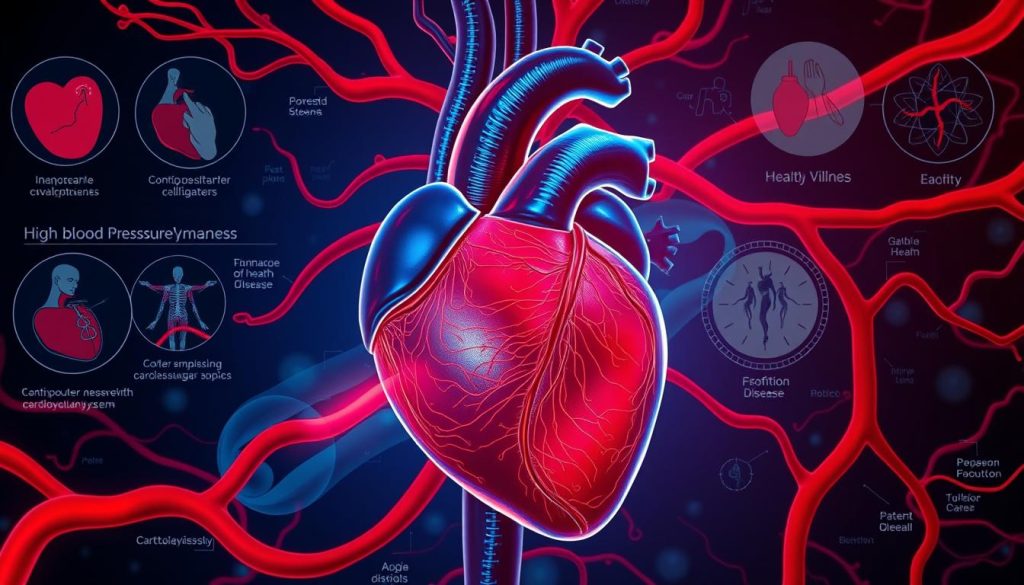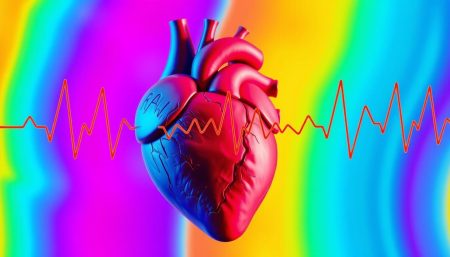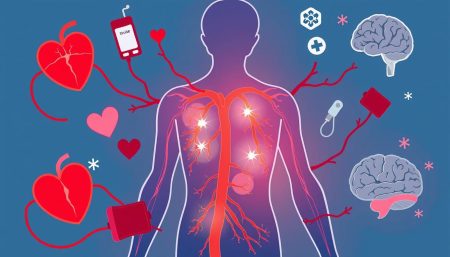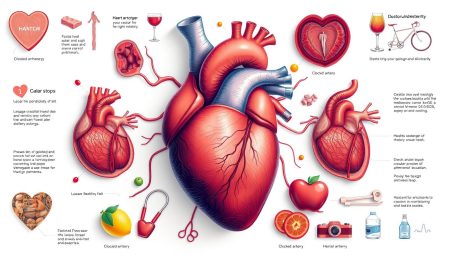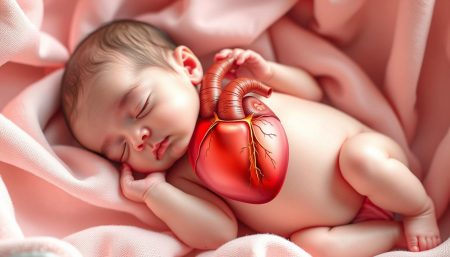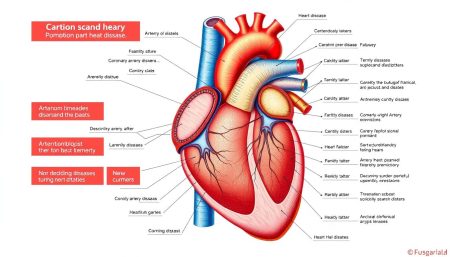High blood pressure, or hypertension, is a silent threat to heart health. Many people wonder if it’s actually a form of cardiovascular disease. The answer isn’t simple, but understanding the connection is key for a healthy heart.
Hypertension is a major risk factor for cardiovascular disease, affecting millions in the United States. It’s often called the “silent killer” because it typically has no symptoms. Yet, it can lead to serious heart problems if left unchecked.
This article explores the link between high blood pressure and heart health. We’ll look at medical views, risk factors, warning signs, and management strategies. By the end, you’ll understand why controlling your blood pressure is essential for a healthy heart.
Understanding the Relationship Between Hypertension and Heart Disease
Hypertension and heart disease are closely linked. High blood pressure puts extra stress on your heart and blood vessels. This can lead to serious health issues over time. Let’s explore how these conditions interact and impact your well-being.
How Blood Pressure Affects Your Cardiovascular System
Your heart works hard to pump blood throughout your body. When you have hypertension, your heart must pump harder. This extra workload can cause:
- Enlarged heart muscle
- Weakened heart function
- Reduced blood flow to vital organs
The Science Behind Arterial Damage
Hypertension causes damage to your arteries through constant high pressure. This pressure can:
- Weaken arterial lining
- Promote plaque buildup
- Increase risk of blood clots
Over time, these changes make arteries less flexible. They become more prone to blockages, raising your risk of heart disease.
Key Indicators of Cardiovascular Strain
Several signs may indicate your cardiovascular system is under strain due to hypertension:
| Indicator | Description |
|---|---|
| Irregular heartbeat | Feels like fluttering or racing in your chest |
| Shortness of breath | Difficulty breathing, specially during physical activity |
| Chest pain | Discomfort or pressure in your chest area |
| Fatigue | Feeling unusually tired or weak |
Understanding these connections helps emphasize the importance of managing hypertension. Regular check-ups and lifestyle changes can make a big difference in preventing heart disease.
Is High Blood Pressure Cardiovascular Disease – Medical Perspective
High blood pressure, or hypertension, is closely linked to cardiovascular disease. It’s not classified as a cardiovascular disease itself but is a major risk factor. Doctors see high blood pressure as a critical indicator of heart health issues.
The medical community stresses the importance of managing blood pressure to prevent cardiovascular problems. Elevated blood pressure strains the heart and blood vessels. This can lead to serious complications.
“Hypertension is often called the ‘silent killer’ because it damages the cardiovascular system without obvious symptoms,” explains Dr. Sarah Johnson, a leading cardiologist.
Understanding the connection between high blood pressure and cardiovascular disease is key for heart health. Here’s how hypertension affects the cardiovascular system:
- Increased workload on the heart
- Damage to arteries and blood vessels
- Higher risk of heart attacks and strokes
- Potential for developing heart failure
Regular blood pressure checks are essential for early detection and prevention of cardiovascular issues. By keeping blood pressure healthy, you significantly reduce your risk of heart disease.
Common Risk Factors for Hypertension and Heart Problems
Knowing the risk factors for hypertension and heart problems helps you take charge of your heart health. These include genetics, lifestyle, and who you are demographically.
Genetic Predisposition to High Blood Pressure
Your family history is a big factor in your risk for high blood pressure. If your parents or siblings have it, you’re more likely to too. Some genes affect how your body handles salt and blood pressure.
Lifestyle Factors Contributing to Hypertension
What you do every day affects your risk of high blood pressure and heart issues. A bad diet, not exercising, drinking too much, and smoking are big risks. Managing stress is also key to keeping your blood pressure in check.
| Lifestyle Factor | Impact on Blood Pressure |
|---|---|
| High-sodium diet | Increases fluid retention, raising blood pressure |
| Sedentary lifestyle | Weakens heart muscle, reduces circulation efficiency |
| Excessive alcohol | Damages heart muscle, increases blood pressure |
| Smoking | Narrows arteries, elevates heart rate and blood pressure |
Age and Gender-Related Risks
As we get older, our blood vessels lose some stretchiness, raising blood pressure risk. Men tend to face higher blood pressure risks earlier than women. Women’s risk goes up after menopause.
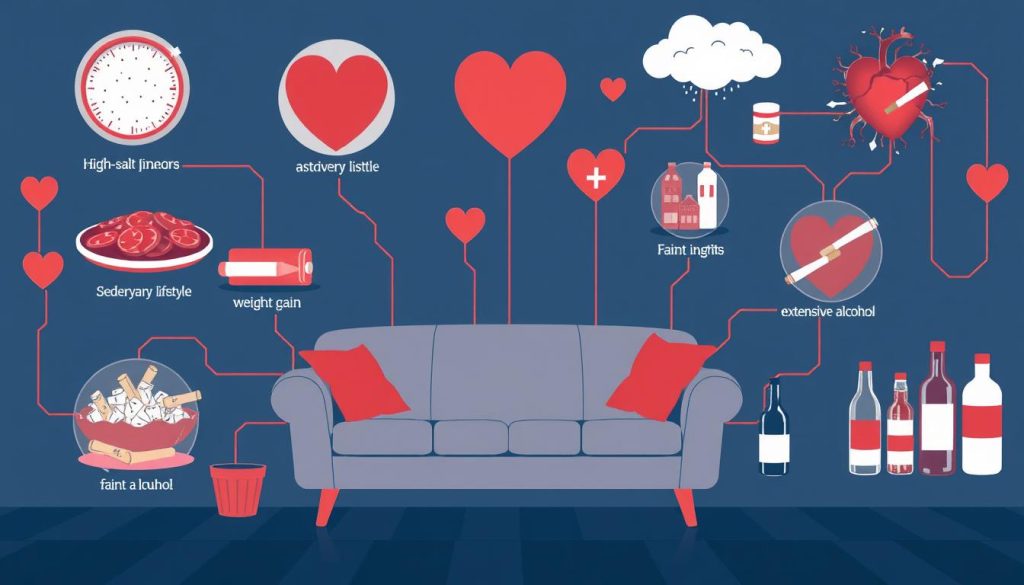
By understanding these risks, you can make better health choices. Work with your healthcare team to create a plan to prevent or manage high blood pressure and heart issues.
Early Warning Signs and Symptoms of Hypertension
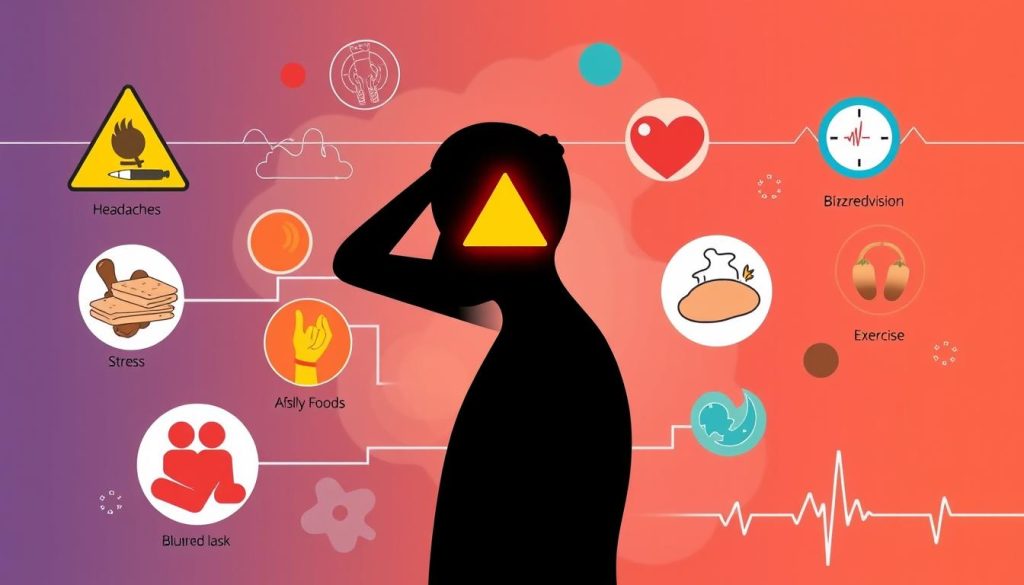
Hypertension, often called the “silent killer,” can hide for years without being noticed. Many people with high blood pressure don’t feel any symptoms. This makes regular health checks very important. There are, though, some early signs that might show your blood pressure is rising.
Knowing these signs can help you get medical help early:
- Persistent headaches, often in the morning
- Dizziness or feeling lightheaded
- Shortness of breath even when you’re not trying hard
- Irregular heartbeat or heart palpitations
- Vision changes or blurry vision
- Nosebleeds without a clear reason
It’s key to remember these signs aren’t just for high blood pressure. They can also mean other health problems. That’s why getting your blood pressure checked regularly is vital, even if you feel okay.
“Don’t wait for symptoms to appear. High blood pressure can damage your body for years before you notice anything wrong.”
If you keep seeing these signs, see your doctor right away. They can check your blood pressure and see if you need more tests or treatment. Remember, catching and treating high blood pressure early can greatly lower your risk of serious problems like heart disease and stroke.
The Impact of Untreated High Blood Pressure on Heart Health
Untreated high blood pressure can harm your heart health a lot. It can damage blood vessels and vital organs if not treated. Ignoring hypertension can lead to serious problems.
Long-term Effects on Blood Vessels
High blood pressure makes your heart work too hard. This strains the walls of blood vessels. Over time, blood vessels become stiff and narrow.
As arteries lose their flexibility, blood flow drops. This means organs don’t get enough oxygen and nutrients.
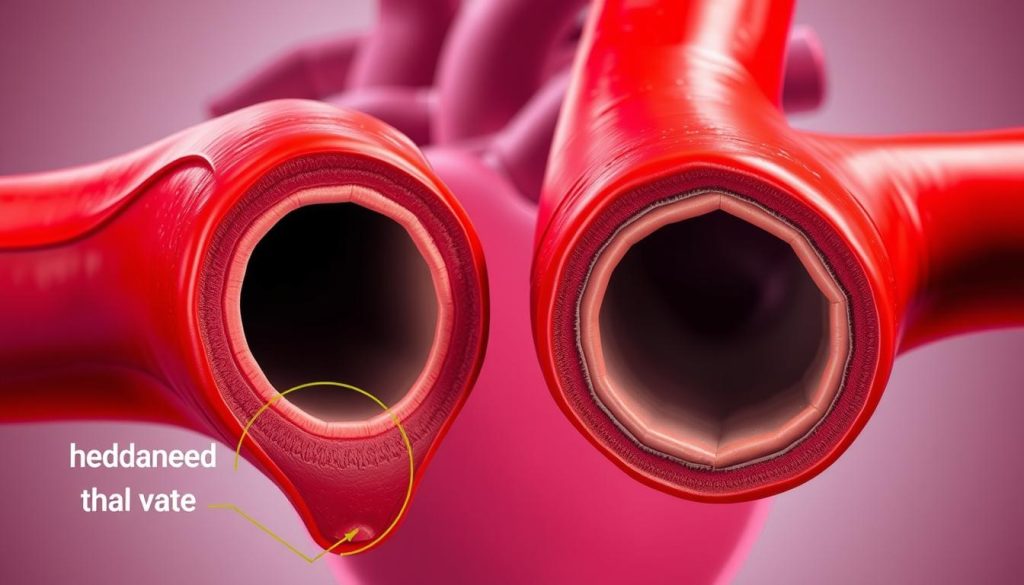
Organ Damage and Complications
Hypertension affects major organs badly. Your heart might grow bigger, raising the chance of heart failure. Kidneys have trouble filtering waste.
Brain vessels can weaken, increasing stroke risk. Eyes and sexual function can also be harmed.
- Heart: Enlarged, weakened muscle
- Kidneys: Reduced filtering ability
- Brain: Increased stroke risk
- Eyes: Damaged blood vessels
Life Expectancy Considerations
Untreated high blood pressure can shorten your life by 10-20 years. But, managing it well can add years to your life. Regular check-ups, lifestyle changes, and medication can help keep your heart healthy.
“High blood pressure is a ticking time bomb for your cardiovascular system. Don’t wait for symptoms – take action now to protect your heart and future.”
Essential Blood Pressure Management Strategies

Keeping your blood pressure in check is key to preventing heart disease. A mix of lifestyle changes and medical care can help. Let’s look at important ways to keep your blood pressure healthy.
Changing your lifestyle is a big part of controlling blood pressure. Regular exercise, managing stress, and keeping a healthy weight are essential. Try to do at least 150 minutes of moderate exercise each week to boost your heart and blood flow.
What you eat also matters a lot. The DASH diet focuses on fruits, veggies, whole grains, and lean proteins. Cutting down on sodium to under 2,300 mg a day can help lower your blood pressure.
“Small changes in your daily habits can make a big difference in your heart health.”
For some, just changing their lifestyle isn’t enough. In these cases, doctors may prescribe medication. It’s important to follow your medication plan and go to regular check-ups to track your progress.
Remember, early detection and prevention are vital for managing blood pressure and other health issues. Sticking to these strategies can greatly improve your heart health and overall well-being.
- Monitor your blood pressure regularly
- Limit alcohol consumption
- Quit smoking
- Manage stress through relaxation techniques
By adding these blood pressure management tips to your daily life, you’re taking big steps towards a healthier future and preventing heart disease.
Dietary Approaches to Stop Hypertension (DASH)
The DASH diet is a great way to control blood pressure with smart food choices. It focuses on meals that are good for your heart. These meals are full of nutrients that help keep your heart healthy.
Recommended Foods for Blood Pressure Control
A DASH-friendly plate is full of fruits, vegetables, whole grains, and lean proteins. These foods are packed with potassium, magnesium, and fiber. They help lower blood pressure naturally.
- Colorful fruits and vegetables
- Whole grains (brown rice, oats, quinoa)
- Lean meats, fish, and poultry
- Low-fat dairy products
- Nuts, seeds, and legumes
Sodium Reduction Guidelines
It’s important to watch your sodium intake to manage high blood pressure. The DASH diet suggests keeping sodium under 2,300 mg a day. For many adults, aiming for 1,500 mg is even better.
| Sodium Level | Daily Limit | Recommended For |
|---|---|---|
| Standard | 2,300 mg | General population |
| Lower | 1,500 mg | Adults with hypertension |
Meal Planning for Heart Health
Creating heart-healthy meals is all about balance and flavor. Here are some easy tips:
- Fill half your plate with fruits and vegetables
- Choose whole grains over refined carbohydrates
- Opt for lean proteins and plant-based protein sources
- Use herbs and spices instead of salt for flavoring

By sticking to these DASH diet tips, you can make tasty meals. These meals will help you reach your blood pressure goals and keep your heart healthy.
Exercise and Physical Activity Guidelines for Hypertension
Regular exercise is key for managing high blood pressure and keeping your heart healthy. It helps lower blood pressure and strengthens the heart. For those with high blood pressure, a good exercise plan can change their health journey.
The American Heart Association suggests at least 150 minutes of moderate-intensity aerobic activity each week. Or, you can do 75 minutes of vigorous-intensity aerobic activity. Activities like brisk walking, swimming, cycling, or dancing are great options. Start slow and gradually increase the intensity and duration of your workouts.
“Physical activity is like medicine for the heart. It’s one of the most effective ways to manage hypertension naturally.”
Strength training is also important. Aim for two to three sessions per week, focusing on major muscle groups. This type of exercise builds lean muscle mass, boosting metabolism and helping control blood pressure.
- Start with a 5-10 minute warm-up
- Include a mix of aerobic and strength training exercises
- Cool down with stretching exercises
- Stay hydrated throughout your workout
Before starting any new exercise program, talk to your healthcare provider. This is even more important if you have hypertension or other health concerns. They can help create a safe and effective plan for you.
Medication Options and Treatment Plans
Managing high blood pressure often means making lifestyle changes and taking medication. Your doctor might give you blood pressure medications to help control it. Let’s look at common treatments and what to consider.
Common Blood Pressure Medications
There are many medications for high blood pressure. Each type works in a different way to lower blood pressure. They might be used alone or together.
| Medication Class | Examples | How They Work |
|---|---|---|
| ACE Inhibitors | Lisinopril, Enalapril | Relax blood vessels |
| Beta Blockers | Metoprolol, Atenolol | Slow heart rate |
| Calcium Channel Blockers | Amlodipine, Diltiazem | Relax blood vessel walls |
| Diuretics | Hydrochlorothiazide, Furosemide | Remove excess fluid |
Understanding Drug Interactions
Blood pressure medications can react with other drugs, supplements, or foods. It’s important to tell your doctor about all medications you’re taking. This helps avoid drug interactions. Some common interactions include:
- NSAIDs like ibuprofen may reduce the effectiveness of certain blood pressure medications
- Grapefruit juice can interfere with the metabolism of some hypertension drugs
- Certain antidepressants may increase blood pressure when combined with some medications
When to Adjust Treatment
Your treatment plan might need changes over time. Regular check-ups are important to make sure your medications are working. Your doctor might change your treatment if:
- Your blood pressure remains high despite medication
- You experience side effects from your current medication
- Your overall health condition changes
- You start or stop other medications that might interact with your hypertension treatment
Never change your medication without talking to your healthcare provider. They will help you find the best treatment plan for managing your hypertension.
Regular Monitoring and Prevention Strategies
Starting your journey to better heart health is simple. It begins with regular blood pressure checks. By tracking your numbers, you can catch any issues early. Home monitoring kits make it easy to keep an eye on your blood pressure every day.
- Sit quietly for 5 minutes before measuring
- Keep your arm at heart level
- Take readings at the same time each day
- Record your results to share with your doctor
Preventing high blood pressure is key to keeping your heart healthy. A heart-healthy lifestyle can greatly lower your risk of hypertension and its complications.
Here are some important prevention tips:
- Eat a balanced diet with lots of fruits, veggies, and whole grains
- Stay under 2,300 mg of sodium a day
- Do at least 30 minutes of exercise every day
- Use relaxation techniques or meditation to manage stress
- Stay away from tobacco and don’t drink too much alcohol
Your path to better heart health is a continuous one. Regular doctor visits, along with home monitoring and lifestyle changes, are your best defense against high blood pressure and its dangers.
Natural Remedies and Alternative Treatments
Looking into natural remedies and alternative treatments for high blood pressure can be helpful. Many people see benefits from making lifestyle changes and using holistic methods. These often aim to lower stress and improve heart health.
Herbal supplements like garlic, hawthorn, and hibiscus tea are popular for high blood pressure. But, it’s important to talk to a doctor before trying them. Stress-reducing activities like meditation, yoga, and deep breathing can also help manage blood pressure.
Acupuncture and biofeedback are alternative treatments that might support heart health. While they shouldn’t replace medicines, they can be part of a full plan to manage blood pressure. The key is to find a mix of treatments that suits you best.
Always check with your doctor before adding new natural remedies or alternative treatments. This makes sure they won’t harm your current medicines or health. With the right advice, these methods can be great for improving your heart health and blood pressure.
FAQ
Q: Is high blood pressure considered a cardiovascular disease?
A: High blood pressure, or hypertension, is not a cardiovascular disease itself. But it’s a big risk factor for heart and vascular problems. If not treated, it can lead to heart disease, stroke, and other serious issues.
Q: How does high blood pressure affect the cardiovascular system?
A: High blood pressure strains your heart and blood vessels. Over time, it can damage the arteries. This damage increases the risk of heart attacks, strokes, and other cardiovascular problems.
Q: What are the early warning signs of hypertension?
A: Hypertension is often called the “silent killer” because it has no early signs or symptoms. Some people might get headaches, shortness of breath, or nosebleeds. But these symptoms show up only when blood pressure is very high. Regular blood pressure checks are key for early detection.
Q: Can lifestyle changes help manage high blood pressure?
A: Yes, making lifestyle changes can help manage blood pressure. Eating a heart-healthy diet, like the DASH diet, is important. Regular exercise, maintaining a healthy weight, and managing stress are also key. These changes can lower blood pressure or make treatments more effective.
Q: What is the DASH diet, and how does it help with hypertension?
A: The DASH diet is a flexible eating plan to treat or prevent high blood pressure. It focuses on fruits, vegetables, whole grains, and lean proteins. It limits foods high in saturated fats and added sugars. This diet is rich in potassium, calcium, and magnesium, which help lower blood pressure.
Q: How often should I monitor my blood pressure?
A: If you have hypertension or are at risk, daily home monitoring is often advised. Your doctor may suggest a different frequency. Checking your blood pressure at least twice a week is a good practice. It helps track treatment effectiveness and spot any concerning trends.
Q: Are there natural remedies that can help lower blood pressure?
A: Yes, natural approaches like herbal supplements and stress-reduction techniques can help. Garlic and hawthorn are examples of herbal supplements. Meditation and deep breathing exercises can also help. But always talk to your healthcare provider before trying any natural remedies, as they can interact with medications.
Q: What are the long-term effects of untreated high blood pressure?
A: Untreated hypertension can lead to serious health issues. These include heart disease, heart attacks, heart failure, stroke, kidney damage, vision problems, and cognitive decline. It also increases the risk of aneurysms and can shorten life expectancy if not managed.
Q: How does exercise help in managing hypertension?
A: Exercise strengthens your heart, making it pump blood more efficiently. This reduces the force on your arteries, lowering blood pressure. Aim for 150 minutes of moderate-intensity aerobic exercise or 75 minutes of vigorous-intensity aerobic exercise per week. Muscle-strengthening activities at least twice a week are also beneficial. Always consult your doctor before starting a new exercise regimen.
Q: What are the common medications used to treat high blood pressure?
A: Several medications are used to treat hypertension. These include ACE inhibitors, ARBs, calcium channel blockers, diuretics, and beta-blockers. The choice depends on the severity of hypertension, other medical conditions, and side effects. Your doctor will help find the best treatment plan for you.












